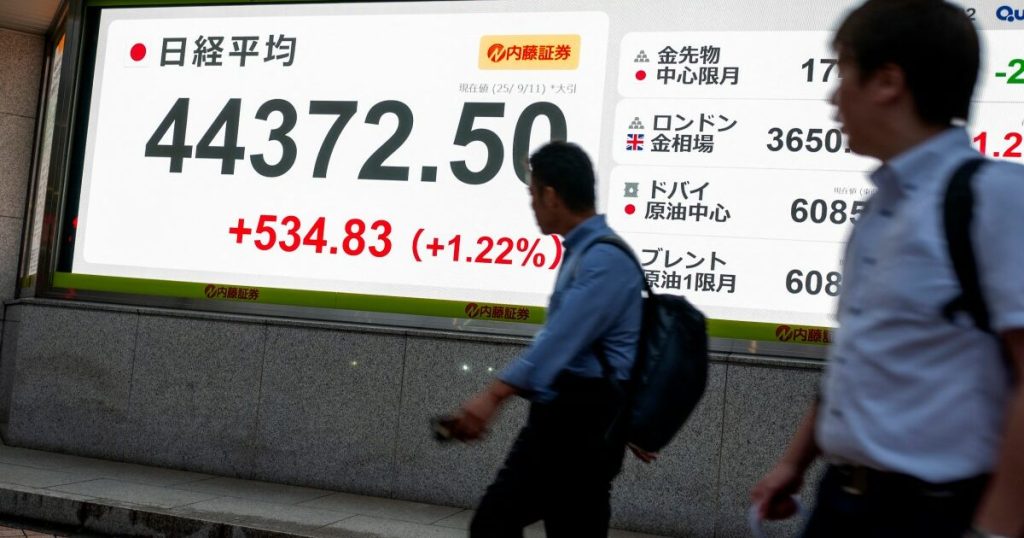Global financial markets experienced a week of mixed yet generally positive performance, driven by anticipation of a US interest rate cut and influenced by various geopolitical and economic factors. US stock indices, including the S&P 500 and Nasdaq Composite, reached new record highs, fueled by expectations that the Federal Reserve would reduce borrowing costs at its upcoming meeting. This optimism stemmed from recent US inflation and jobless claims data, which reinforced the belief that a rate cut was imminent. While some analysts noted a lack of strong buying conviction, the absence of significant selling pressure despite the record highs suggested continued market confidence.
European markets presented a more subdued picture, ending the week largely flat. Asian markets, however, showed notable gains, with Hong Kong’s Hang Seng Index leading the way, boosted by a surge in Alibaba’s share price following its foray into the artificial intelligence sector. Tokyo and Seoul markets also hit fresh records during the week. London’s FTSE 100, while flirting with a new all-time high, ultimately retreated, influenced by data revealing stagnation in the UK economy in July and a subsequent drop in the British pound.
The anticipated rate cut by the Federal Reserve is seen as a response to evolving economic conditions. Markets predict not only a quarter-point reduction next week but also two further cuts of the same magnitude in the remaining Fed meetings this year. This move towards looser monetary policy is generally viewed as supportive of stock markets, as lower interest rates can spur economic activity and corporate investment.
Beyond the US, other central banks also faced critical decisions regarding monetary policy. Russia’s central bank lowered its key interest rate to 17% amidst concerns of an economic slowdown, highlighting the challenges posed by geopolitical tensions and sanctions. The Bank of England is expected to maintain its current rate, caught between the conflicting pressures of high inflation and stagnant growth. The European Central Bank also held its rates steady, citing controlled inflation and eased trade tensions as justification, even as political instability in France adds a new layer of complexity to the economic landscape.
Adding to the global economic picture, the price of gold, often considered a safe-haven asset, continued its upward trajectory, reaching new record highs. This surge was attributed to escalating tensions surrounding the Israel-Gaza conflict and the ongoing Russia-Ukraine war, as investors seek refuge from market volatility. These geopolitical uncertainties add to the complex interplay of factors shaping global markets.
Oil prices also experienced an upswing, driven by concerns about potential further sanctions on Russian crude exports. This upward pressure on oil prices outweighed concerns about potential oversupply in the market, reflecting the sensitivity of energy markets to geopolitical developments. The interplay between supply concerns and potential sanctions creates a volatile environment for oil prices.
The week’s market performance highlights the intricate relationship between monetary policy, geopolitical events, and investor sentiment. The anticipation of a US rate cut, coupled with various economic and political factors, contributed to the mixed performance across global markets. While US indices reached new heights, other regions exhibited more cautious movements, reflecting the diverse challenges and opportunities present in the current global economic landscape. The continued rise in gold prices underscored the prevailing uncertainty, with investors seeking safe havens amidst geopolitical tensions.
Stock markets are forward-looking, often pricing in anticipated future events. The current rally in US stocks appears to be driven by the expectation of lower interest rates and the potential for continued economic growth, even amidst geopolitical uncertainties. However, the lack of strong buying conviction raises questions about whether the current valuations are sustainable in the long term. The market’s trajectory will depend on the actual decisions made by central banks, the evolution of geopolitical conflicts, and the underlying strength of global economies.
Central bank decisions play a critical role in shaping market expectations and influencing investment decisions. The Federal Reserve’s upcoming meeting is being closely watched by investors, as a rate cut would signal a shift towards a more accommodative monetary policy. This could potentially fuel further market gains, although the extent of the impact will depend on the size of the cut and the accompanying commentary from the Fed. Other central banks, such as the Bank of England and the European Central Bank, also face challenging decisions as they navigate conflicting economic pressures.
Geopolitical events continue to exert a significant influence on market sentiment. The ongoing conflicts in Israel-Gaza and Russia-Ukraine contribute to market volatility and drive investors towards safe-haven assets like gold. The potential for further sanctions on Russia also adds to the uncertainty surrounding oil prices and the global energy market. These geopolitical risks underscore the interconnectedness of global markets and the potential for rapid shifts in investor sentiment.
The current market environment presents both opportunities and challenges for investors. While the prospect of lower interest rates and continued economic growth supports a positive outlook for stocks, the potential for overvaluation and geopolitical risks warrant caution. Investors need to carefully assess the evolving economic and political landscape and make informed decisions based on their individual risk tolerance and investment goals.
The interplay between monetary policy, geopolitical events, and investor sentiment will continue to shape the direction of global markets in the coming months. The upcoming decisions by central banks, the evolution of geopolitical conflicts, and the release of key economic data will all play a crucial role in determining market performance. Investors should remain vigilant and adaptable in this dynamic environment.


